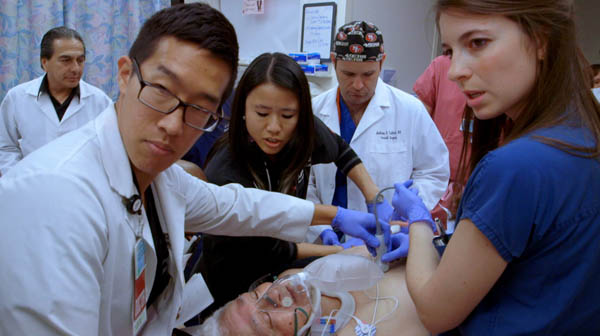
KK: How did it affect your personal life?
Explore This Issue
ACEP Now: Vol 33 – No 06 – June 2014RM: It was significant. I didn’t expect to make a film as a resident. It was three years of no vacation, and any day off I had went toward this effort. The goal of residency is to learn how to be a proficient physician, and I had to be careful in order to assure that the film could never be more important than that. I have to thank every one of my classmates and my program director for a lot of support along the way, whether for last-minute trades or just the ability to take a 20-minute nap on a shift. Even still…residency by default should consume you, and filmmaking by default should consume you. You put them together at the same time, and there’s going to be some fallout.
KK: Do you regret the decisions you’ve made?
RM: I regret allowing the pressure to dictate how I acted and how I thought. I certainly don’t regret making Code Black at the time that I did. One thing that I feel very lucky to have experienced is nonmedical people sitting through some pretty tough stuff in cases we show, and at the end of the film people give us a standing ovation. I wish I could share that with every physician, nurse, and X-ray tech who leaves a really tough shift.
KK: Is this just a venture of altruism, or is there the potential for you to have some well-deserved financial benefit?
RM: It takes in the low seven figures to produce a film of this scope. Nobody makes a buck off of documentaries. Your best-case scenario is that you break even and that you change how people think.
KK: Roughly, what does it take to produce a documentary like this?
RM: The film is supported by SonoSite FujiFilm. We made an agreement with them that said in exchange for private support for the production, we would make a true story about the challenges of the front lines—and the sponsor did this without any control with regards to creative oversight or required brand placement. We went through 16 cuts on Code Black. For a documentary, you’re building an essay from a vast vocabulary of footage that exists as a library in volume. So you have an editor, an assistant editor, an archivist, a sound designer, a sound mixer, a color corrector, and, of course, all of the producers it takes to make a documentary.
Pages: 1 2 3 4 | Single Page





No Responses to ““Code Black” Documentary about Los Angeles County General Hospital Captures the Challenge, Energy of Emergency Medicine”